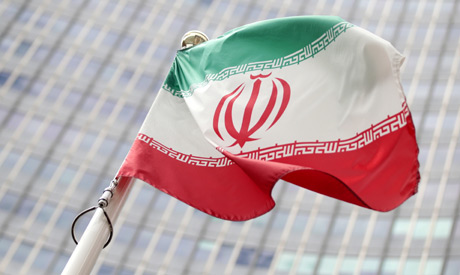
File Photo: The Iranian flag flutters in front of International Atomic Energy Agency (IAEA) headquarters in Vienna, Austria July 10, 2019. (Photo: Reuters)
The UN's nuclear watchdog confirmed Monday that Iran was installing advanced centrifuges as the troubled 2015 deal with world powers over Tehran's nuclear programme threatens to fall apart.
The International Atomic Energy Agency (IAEA) said in a statement that on September 7 it had "verified that the following centrifuges were either installed or being installed...: 22 IR-4, one IR-5, 30 IR-6 and three IR-6s".
The IAEA's confirmation comes a day after Tehran hit out at European powers, saying they had left Iran little option but to scale back its commitments under the 2015 Joint Comprehensive Plan of Action (JCPOA).
The IAEA added in its statement that the centrifuges had been installed at Iran's Natanz facility and said "all of the installed centrifuges had been prepared for testing with UF6 (uranium hexafluoride), although none of them were being tested with UF6 on 7 and 8 September 2019".
"In addition, in a letter to the Agency dated 8 September, Iran informed the Agency that it would reinstall the piping at two R&D lines to accommodate a cascade of 164 IR-4 centrifuges and a cascade of 164 IR-2m centrifuges," the agency's statement said.
Iran has said that notwithstanding its reduction of commitments under the JCPOA, it will continue to allow access to IAEA inspectors who monitor its nuclear programme.
'Wrong approach'
Iran has already broken the limits on uranium enrichment level and the overall stockpile of enriched uranium which were laid down in the JCPOA.
On Sunday the IAEA's Acting Director General Cornel Feruta was in Tehran where he met senior Iranian officials.
Later Monday Feruta will address the beginning of the quarterly meeting of the IAEA's Board of Governors.
Also on Monday, China -- which along with France, Germany, Britain and Russia is also a signatory to the JCPOA -- called on the US to "give up its wrong approach such as unilateral sanctions and extreme pressure against Iran".
The JCPOA has been under mounting pressure since the US withdrew from the deal in May 2018 and then re-introduced sanctions on Iran.
"At the same time, all parties to the agreement should also commit themselves to the full and effective implementation" of the JCPOA, Chinese foreign ministry spokeswoman Hua Chunying told reporters in Beijing.
"We hope that the relevant parties can meet at halfway and push for the easing of tensions around the Iranian nuclear issue," Hua said.
Short link: